#Third Servile War
Text
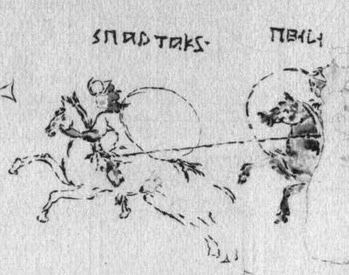
Spartacus (MIA 71 BC) in a near contemporary depiction from a Pompeiian (pre 79 AD) tavern graffito. I don’t know of any other roman depictions of Spartacus.
4 notes
·
View notes
Text
youtube
#music#aram khachaturian#adagio#spartacus and phrygia#marcus crassus#third servile war#saturday working music#rome#roman#spqr#tv series#onedin line
1 note
·
View note
Note
do you have any non-fiction book recs on slavery and the Third Servile War in ancient rome? I've seen posts that defended or played down slavery in ancient Rome claiming they treated their slaves well and typically didn't abuse them without a good reason, because they'd risk the loss of property and these posts just didn't seem right to me. If they actually treated them well there wouldn't have been slave uprisings. If they slaves had rights they wouldn't have been called slaves.
i haven't read a lot of modern accounts of the third servile war, but shaw's spartacus and the slave wars is a phenomenal sourcebook for you to look through ancient documents about the servile wars and the general treatment of slaves. it contains ancient historical texts, but it also pulls from relevant sources like letters and inscriptions that discuss things like laws pertaining to fugitive slaves. some of my followers and other classicists in the tumblr classics community who know more about the subject than i do might be able to offer up some other sources.
as far as treating their slaves well- the first thing to remember is that slavery, no matter how "well" the slaves were treated, is still slavery. at its core, slavery treats human beings as if they were property and strips them of their rights. in addition, while some particularly skilled slaves or slaves that had been in a household for a long time were treated more compassionately than others, the vast majority of slaves were not given this treatment. many of them were treated with little to no dignity and were forced to complete difficult, sometimes dangerous, jobs. for every tiro we know of, there were probably thousands of unnamed slaves being treated as little more than expendable farm equipment. the relative good fortune of a handful of slaves does not in any way justify slavery.
117 notes
·
View notes
Text
Poll for THG Book Club's First Read!
What book should we read for our first Suzanne Read? Summaries of each book and how it relates to THG under the "read more" after the poll if you need more info to choose.
Summary: In Thomas Hardy's first major literary success, independent and spirited Bathsheba Everdene has come to Weatherbury to take up her position as a farmer on the largest estate in the area. Her bold presence draws three very different suitors: the gentleman-farmer Boldwood, the soldier-seducer Sergeant Troy, and the devoted shepherd Gabriel Oak. Each, in contrasting ways, unsettles her decisions and complicates her life, and tragedy ensues, threatening the stability of the whole community. One of his first works set in the semi-fictional region of Wessex, Hardy's novel of swift passion and slow courtship is imbued with his evocative descriptions of rural life and landscapes, and with unflinching honesty about sexual relationships.
Far From the Madding Crowd by Thomas Hardy
How it relates to THG: "Katniss Everdeen owes her last name to Bathsheba Everdene, the lead character in Far From the Madding Crowd. The two are very different, but both struggle with knowing their hearts." Suzanne Collins, 2010
Summary: Coriolanus is a tragedy by William Shakespeare, believed to have been written between 1605 and 1608. The play is based on the life of the legendary Roman leader Caius Marcius Coriolanus.
Coriolanus by William Shakespeare
How it relates to THG: The namesake of Coriolanus Snow (ft. Volumnia)
Frankenstein by Mary Shelly
Summary: Mary Shelley's timeless gothic novel presents the epic battle between man and monster at its greatest literary pitch. In trying to create life, the young student Victor Frankenstein unleashes forces beyond his control, setting into motion a long and tragic chain of events that brings Victor to the very brink of madness. How he tries to destroy his creation, as it destroys everything Victor loves, is a powerful story of love, friendship, scientific hubris, and horror.
How it relates to THG: Quoted in the epigraph of TBOSAS
Spartacus by Howard Fast
Summary: The story of a slave uprising in the ancient Roman Empire.
How it relates to THG: "There’s a basis for the war, historically, in the Hunger Games, which would be the third servile war, which was Spartacus’ war, where you have a man who is a slave who is then turned into a gladiator who broke out of the gladiator school and led a rebellion and then became the face of the war. So there is a historical precedent for that arc for a character. But I think I needed the freedom to create elements that I wasn’t going to neatly find in history." Suzanne Collins, 2013
Summary: A plane crashes on a desert island. The only survivors are a group of schoolboys. By day, they discover fantastic wildlife and dazzling beaches, learning to survive; at night, they are haunted by nightmares of a primitive beast. Orphaned by society, it isn't long before their innocent childhood games devolve into a savage, murderous hunt …
Lord of the Flies by William Golding
How it relates to THG: "One of my favorite books - I read it every couple of years." Suzanne Collins
40 notes
·
View notes
Text
Inmate Crucifixion Day!!!
So it's no big surprise that the QSMP has some religious imagery going on, and today's supposed conclusion to the Prison Arc is no exception. Today, the inmates are going to be crucified, and we all know what that is.
Right?
Well, hi, I'm A.D., I'm a historian, and today I'm going to teach you all about crucifixion!
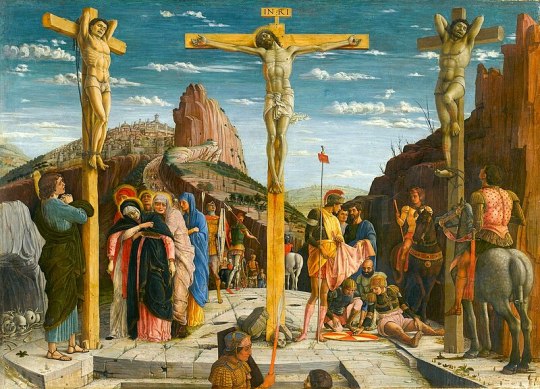
Now, crucifixion is a longstanding execution method that dates back way before Jesus was even thought of. We've got accounts of crucifixions dating back to the Persians under Darius I, and we've got even more accounts from all over the place in the ancient world.
Now, let's go over some history real quick, shall we?
~522 BCE: Polycrates, the tyrant of Samos, is crucified postmortem by some pissed-off Persians. Maybe.
We don't actually know if this one happened or not, but we do know that he was assassinated. That much is true. The crucifixion part is what's up for debate, but, if it is true, then Polycrates here has the privilege of being the first ever victim of crucifixion. Lucky him!
~519 BCE: Darius I orders the crucifixion of something approximating 3,000 political opponents in Babylon
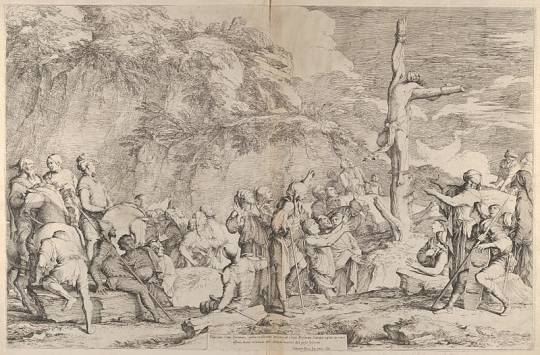
See, the thing about Persian crucifixions is that the prisoners weren't usually nailed to the cross shape we all know. Nah, they were tied up with their hands above their heads, strung up on a single pole. This way, their death would take a lot longer, and the prisoner would suffocate under their own weight. This would last for days, usually with the prisoner being left up to be humiliated even after their death.
~417 BCE: Persian general and tyrant Artaÿctes is crucified by Athenians in a rather uncharacteristic act
But also take this with a grain of salt because this account comes from Herodotus, and I don't trust that dude with much more than a fun story.
The Greeks didn't really think much of crucifixion. They were like, "We're above this. We are civilized", but also. They did not like the whole "Persian Invasion" thing, and so sometimes they ended up resorting to measures they weren't too happy with. Such is war!
~332 BCE: Speaking of war, Alexander the Great supposedly had 2,000 survivors of his siege of Tyre crucified.
The thing with Alexander is that a lot of what people say about him is probably bullshit.
~88 BCE: Ancient Judean king Alexander Jannaeus supposedly had 800 Pharisees-slash-rebels crucified in the middle of Jerusalem
And now we get to the Romans, who kinda perfected the whole thing. They were super into crucifixion. They were so into it that they had a bunch of different ways of doing it!
Getting impaled on a stake
Getting tied to a tree
Getting tied to a crux simplex (see image below)
Getting stuck to a cross

The whole crucifixion thing was seen as a way to deter people from doing the same crimes that the crucified people did. It was all about torture and humiliation. We have reports of people being crucified for days, and of people having to carry their own crucifixes (see: Jesus Christ.)
Sometimes people were tied to their crucifixes. Sometimes they were nailed to them. It varied by region and by criminal and by executor. Criminals were generally stripped completely naked (again, humiliation), though, again, the position depended on the region, criminal, and executor. The way Jewish people were executed was different than how, say, slaves or renegade gladiators were executed.
I'm not going to get into the whole process because that's very long and yucky. But I will repeat just how popular it was! Because MAN, the Romans LOVED it! Crassus ordered the crucifixion of at least 6,000 rebels and followers of Spartacus after the Third Servile War (but, then again, he was a piece of shit.)
Of course, we can't forget about the most famous crucifixion of all:
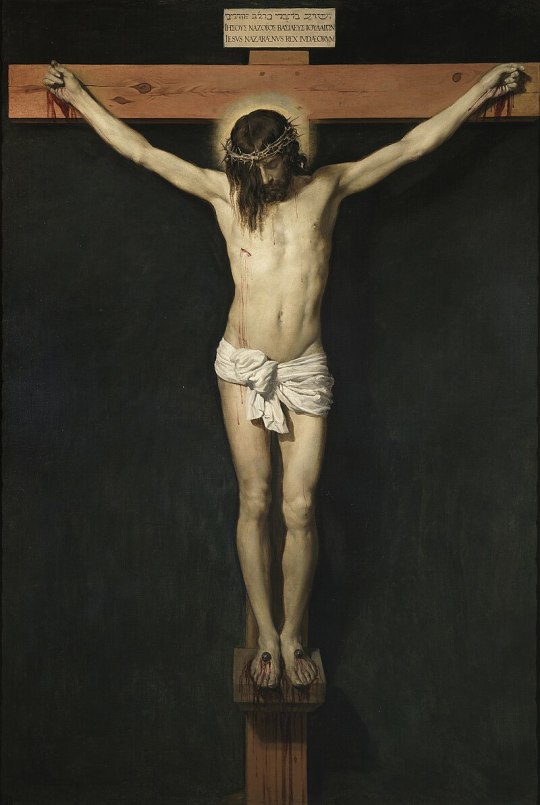
~32 CE: Jesus.
Jesus of Nazareth remains the most famous victim of crucifixion, and it's because of the nature of his particular crucifixion that everybody thinks of crucifixion as The Thing With The Cross.
And this is probably what everybody's thinking of when they're talking about the QSMP inmates being crucified today.
But he wasn't the only religious figure to be crucified!
Cut to:
Either 274 CE or 277 CE: Mani, the Parthian Prophet and the founder of Manichaeism, is crucified in a way super similar to Jesus
Tbh we don't know when he died, but his followers purposefully compared his death to Jesus' despite there possibly being literally no crucifixion involved at all.
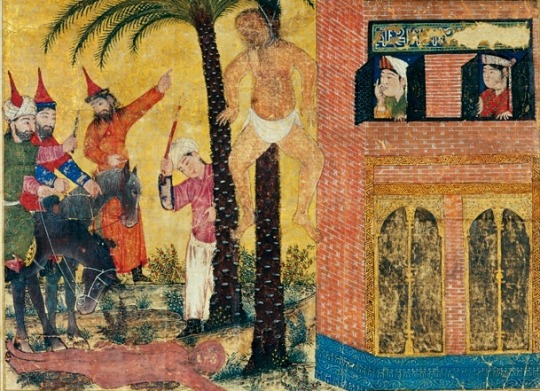
But, you know what? Crucifixion happened all over the place!
Islamic territories had crucifixion going on simply because they lived where crucifixion had been taking place for centuries, and there was a lot of debate surrounding crucifixion in relation to the various rules and regulations surrounding criminality and the potential justification of execution.
Japan, interestingly enough, also has a pretty long history of crucifixion. Supposedly, it was introduced in the 15th century by pesky Christian missionaries, but the Japanese had had a similar tradition going on before that. But Japanese crucifixion, called haritsuke wasn't really like the kind we're familiar with. There was water crucifixion (mizuharitsuke) reserved for Christians, and there was upside-down crucifixion (sakasaharitsuke.) Fun!
(There is photo evidence of this even up on the Wikipedia page, but you can find that on your own. I'm not putting that on my blog, thanks.)
As the years continued, crucifixion became a bit less widespread, though there is photo evidence of its use in Japan up through the 19th century, and then reports of it being used in World War One by the Germans and then in World War Two against the Germans.

Unfortunately, it's still a practiced tradition in a few parts of the world. Saudi Arabia and Sudan still have crucifixion as an execution method, and it's still a reported method being used by certain extremist factions in Syria, Iran and Myanmar.
So... yeah! That's crucifixion for you! It's a truly terrible fate, but not an overtly religious one. It only really became religious when Jesus ended up getting killed, and, even then, it's only seen as such by groups of people steeped in Christian culture (such as many countries and cultures living in what people call "The West".)
I can only imagine that the religious aspect is what's going to come into play on the QSMP, because I doubt that this literal Minecraft Roleplay Series will employ actual literal torture and execution methods live on Twitch.
#a.d. talks history#qsmp#i guess! i talk about it!#anyway all my sources are basically from my head and from some quick research#can you tell i was raised catholic?#and that i took a class on ancient persia last year? lol
46 notes
·
View notes
Text
I really do think constantly about how crucifixion was a real punishment that hundreds of thousands of people suffered. If a Roman slave killed their master all of the slaves in the house were to be crucified down to the children. After the third servile war Crassus ordered the crucifixion of six thousand rebel slaves, to be displayed for miles along the road as their bodies slowly rotted. Soldiers after the destruction of Jerusalem would amuse themselves by nailing the bodies in different positions. To think about it is to stare into an infinite abyss of deliberate human suffering etc etc
#the capacity of the state for violence is.. overwhelming#anyway sorry for making a tangentially religious post I was. thinking about it
14 notes
·
View notes
Text
„We shall proceed down the south slopes of the acropolis of Larisa to more familiar ground. Dionysus was worshipped here in one of his well-known settings, close to a monumental theatre constructed in the third century bc. He was invoked as Dionysus Makedonikos in a first-century dedication offered to him by the priestesses of Aphrodite. But he was also worshipped in a more Thessalian guise. A list of the priestesses of Demeter Phylaka and archousai of Dionysus Karpios was inscribed on a first-century stele found in the wider area of the acropolis. The title Karpios for Dionysus seems to have had an old Thessalian pedigree. It can be traced back to the fifth century, when the god received a dedication at Larisa. He was also worshipped at Mikro Keserli, a small settlement to the east of Larisa, and at Gomphoi in western Thessaly.
The pairing of Dionysus and Demeter is not uncommon, given the agricultural connections of both deities, a point reinforced by the title Karpios (deriving from karpos ‘fruit’) given to Dionysus. The cult of both deities, it is often stated, was very popular in Thessaly, an area famous for its agricultural produce. There is quite a lot of evidence for their cult, but we should not consider the matter entirely straightforward and unproblematic. Their cults introduce us to a number of questions concerning the relationship between agriculture and religion in Thessaly.
To help understand the issues at stake we can bring here, as a parallel, the case of Sparta. In both areas much agricultural work was done by the servile classes of the penestai and helots, while anyone with social or political aspirations should have had his hands free from agricultural labour. Related to this characteristic of Spartan society, it has been argued, was the fact that the cults of Dionysus and Demeter did not develop in the way they did elsewhere in the Greek world; only certain aspects of their cult seem to have been prominent. Thessaly, however, was no Sparta. Despite Pindar’s invocation, in the first lines of Pythian 10th, of their common Heraclid origin, the two states were in several respects very different. To boil the matter down to its essentials we could say that Sparta had a military aristocracy, while Thessaly had a landed one. The fertility of the Thessalian land was a common topos in literary sources, and the Thessalian noblemen, although never engaged themselves in agricultural labour, were still very often mentioned in the same breath as their vast estates of lands, their numerous penestai, and large flocks of animals. Neither was the status of the Thessalian under-classes comparable in all matters to that of the helots. The helots were owned by the Spartan state, while no such evidence exists for the penestai, who seem to have been closely associated with their owners; and while every year Sparta declared war against its helots, the Thessalian penestai seem to have found themselves regularly fighting at the side of their masters. In a land that boasted its fertility, it is thus no surprise to find the cult of such agricultural gods as Dionysus and Demeter housed on the acropolis of its cities.”
- Religion and Society in Ancient Thessaly by Maria Mili
7 notes
·
View notes
Text
this is going to be extremely rambling but what immediately struck me about the will of the many is that my first impression was that it's drawing inspiration, as near as i can tell, from an often poorly adapted segment of roman history: not the roman empire itself, but the fall of the roman republic and its transition into an empire. (there's always the off chance that the civilization that preceded the Calamity was meant to be the republic, but that has more etruscan vibes than anything---ok that was an extremely off the cuff comparison don't hold me to that)
there's this period of increasing social unrest, political tension and division, and gradual decline of the "order" of the republic so often idolized now, that culminates in the establishment of the roman empire under caesar augustus. the late republic is characterized by extreme social unrest, with divisions between both the ruling oligarchy and broader, deeper issues in the fabric of the republic itself. there's the social wars and the question of citizenship, which can be related to birthright---but more interestingly, you have the three servile wars, mass slave revolts, the first of which begins on Sicily (and involves taking over a city on the east coast of sicily named Catania, but that's just a fun anecdote).
i'm not really willing to dig through my whole archive of roman republic notes, so from wikipedia:
The Roman conquest of Macedonia, in which thousands of the conquered were sold into slavery...as well as the oppression of corrupt Roman provincial governors...all contributed to a constant supply of new slaves at very cheap price, which made it more profitable for their masters to wear them out by unremitting labor, harshness, exposure and malnutrition, to be cheaply replaced, than to take proper care for their nourishment, health, and accommodation. Accordingly, the plantation system which took shape in Sicily led to thousands of slaves dying every year of toil in the fields from dawn to dusk with chains around their legs, and being locked up in suffocating subterranean pits by night....The Roman Senate failed to take measures to curb this dangerous tendency, which converted one of the most beautiful and fertile provinces of the Republic into a horrible den of misery, brigandage, atrocity and death.
first of all: that really happened! terrible!
second of all: hey that sounds fucking familiar
and not to predict the arc of the series (there's a lot of unionization themes you could read into it, and a lot of "oh my god everyone has normalized this hell so we dont do anything about it NO more death isnt the answer but hello?? does no one care?? fr??" baked in), but like...check out the summary of the third servile war on wiki if you wanna 👀
listen, everything i learned about roman history i learned against my will, but if i had to learn it then by god i will be so silly with it
#the will of the many#this is the most niche + useless post ive ever made#hope you guys enjoy my descent into madness#i think there's literally 4 people in this fandom on this site#fandom is a strong word im not sure how long the interest will last#for me we're on [checks notes] month 5 goin strong#it is EATING MY BRAIN ALIVE#oh yeah we should talk about the zombies#jas jabbers
13 notes
·
View notes
Text
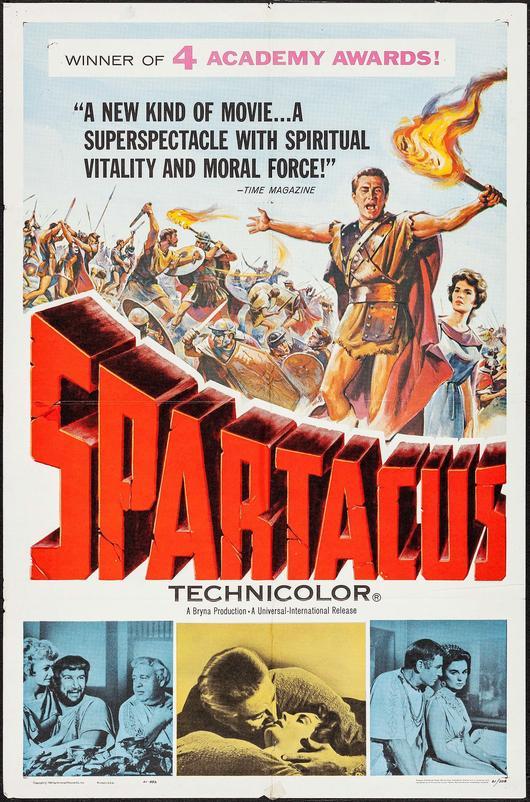

THE HIGHEST GROSSING FILM OF 1960, AND REPORTEDLY THE FIRST THEATRICAL FILM JFK EVER WATCHED DURING HIS PRESIDENCY.
PIC(S) INFO: Spotlight on theatrical poster art for "Spartacus," the 1960 American epic historical drama film starring Kirk Douglas in the title role of the slave who leads a rebellion against Rome and the events of the Third Servile War.
PIC #2: 35th President of the United States, John F. Kennedy (1917-1963), photographed during the 1960 Democratic National Convention in Los Angeles, California. 📸: Elliott Erwitt.
OVERVEIW: "The very first movie President Kennedy watched while in office wasn’t at the White House at all. Instead, Kennedy had to slip out to see director Stanley Kubrick’s "Spartacus" (1960), which White House projectionist Paul Fischer didn’t have a copy of, on account of the film’s 70mm projection requirements. The White House theater’s projectors could only handle 35mm films.
Kennedy crossed a picket line to watch Spartacus on Feb. 3, 1961 at the Warner Theatre, not far from the White House, though it wasn’t over a labor dispute. The American Legion was picketing the film over the film’s writer, Dalton Trumbo, who was a Communist caught up in the anti-Communist fervor of Hollywood in the 1950s.
Kennedy went to "Spartacus" with a friend, Paul “Red” Fay, who the president knew through his service in World War II. Fay was tasked with buying the tickets so that nobody would know the president would be in attendance. But the theater’s management found out somehow, as Fay would recall years later in an oral history, perhaps because Secret Service had to ensure the theater was safe. The President and Fay arrived a little late to the screening, hoping to sneak in without being noticed, but it was clear everyone was waiting for him. They even stopped the movie and rewound it to start from the beginning, something Kennedy only learned about later."
-- FORBES, "Every Movie President John F. Kennedy Watched While in Office," by Matt Novak, published March 27, 2023
Sources: www.forbes.com/sites/mattnovak/2023/03/27/every-movie-president-john-f-kennedy-watched-while-in-office/amp, 1stDibs, Swords and Sandals (blogspot), various, etc...
#Spartacus#Spartacus 1960 Movie#60s#Sword and Sandal#John F. Kennedy#John Fitzgerald Kennedy#Sixties#1960#Democratic National Convention#1960s#Spartacus 1960 Film#Photography#Sword and Sandal Epic#JFK#Poster Art#American Style#Movie poster#Cinema#Americana#Spartacus 1960#Poster#60s Movies#Los Angeles#60s Cinema#L.A.#Elliot Erwitt#DNC 1960#Kennedy
2 notes
·
View notes
Text
augh. ehrughh. I just realized the narrative equivalent of the third servile war is an activist massacre. heurghh.
3 notes
·
View notes
Text
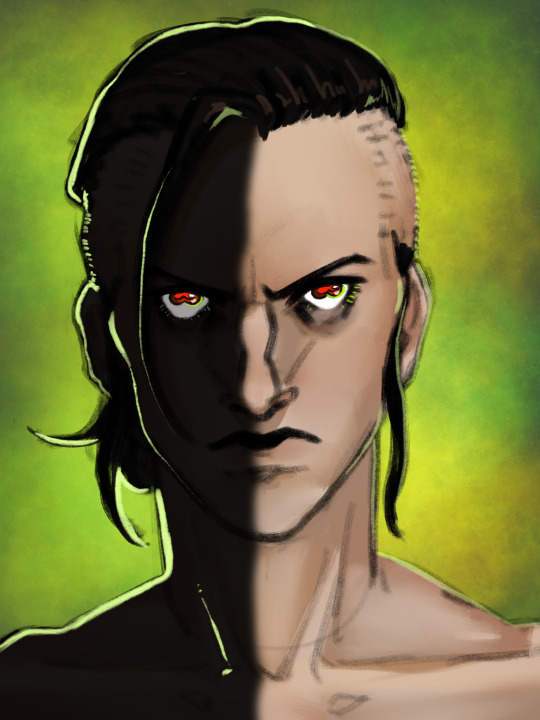
I’ve tagged a few things as “OC: Siryen” so I wanted to give a face to the name. Here’s a portrait :3
She’s a prequal fallout 2 and nv character. She’s the granddaughter of my fallout 2 OC, Anya Markova. To put it short- in 2283 Arroyo is absorbed/assimilated by the Legion, and a year later she’s born into slavery. In 2299 (when the story is set), she and a bunch of slaves revolt and attempt to wage war against the legion (inspired by the third servile war in Rome).
I’d love to talk more about her if anyone is interested.
#OC: Siryen#fallout oc#fallout ocs#fallout OC art#fallout new vegas oc#fallout 2#fallout new vegas#fallout 2 oc
5 notes
·
View notes
Text
Setting Blurb: Non-Imperial Polities
· The Cordons Sanitare: It is misleading to assume that the coalition of warlords and their nascent League was accepted by all the world’s population. A dozen or so city-states located in the Americas, Europe, and Asia remained nominally independent from the League. These independent cities were then used by neighbors in the League to “dump” their political and social undesirables. This practice continued well into the final stages of the Crystalline War, halted only by those cities’ destruction during the war.
· Fugitive Clans: Throughout Imperial territory, Serviles in large enough numbers overpower their captors and flee into areas that are difficult to pursue. In orbital habitats these bands are short lived, but on Mars and other terrestrial colonies fugitive communities can survive for decades before being discovered by Imperial forces.
· Hoppe City: Founded on the planetoid Ceres in the Solar asteroid belt, Hoppe City is home to the largest settlements of the anarcho-capitalist “Covenanter” movement. Hoppe City is also home to a large number of industries deemed too “sinful” for Imperial citizens to pursue (such as the ones that brought about the “Catgirl Incident” during the Transhuman Wars).
· Libertania: Originally a decommissioned Space Force mothership stolen by Belter insurgents during the Mining Wars of the 2600s, the mobile free port became a haven for economic dissidents and others wishing to not live under the Imperial System. Despite abandoning piracy to escape Imperial reprisal, Libertania's denizens maintain some aspects of the "buccaneer lifestyle".
· The Sedna Soviet: During the Martian War for Independence, Imperial military intelligence discovered discrepancies in the projected and actual manpower and equipment used by the disparate rebel groups on Mars. A lengthy investigation revealed that many revolutionary organizations within the Cordons Sanitaire had sent materiel and personnel in support of the rebels. Fearing retribution from the Imperial Military, rebel sympathizer that could fled to the Trans-Neptunian Object Sedna. Over the years, more and more immigrants arrived at the cold planetoid as the Cordons Sanitaire were purged of their more volatile denizens.
· Free Centauri Movement: Many denizens of the Cordons Sanitaire by the dawn of the 29th Century were desperate to escape their dilapidated living conditions on Earth. So desperate in fact, that they were willing to indenture themselves to the Imperial firms responsible for the construction and maintenance of colonial spacecraft. Following the arrival at Alpha Centauri, through manumission or mutiny, many of those laborers (and a few former Imperial sympathizers) made their way to Alpha Centauri A’s asteroid belt and established their own polities there.
· Xorta Conglomerate: As the Imperial League constructed their colonial spacecraft, many independent “Adventurers, Contractors, and Security” hired themselves onto the project. Cryogenically freezing themselves, these independents broke off once the expedition reached Proxima Centauri and seized Proxima Centauri C for themselves.
· The Spartacus Republic/State of Atlas: Like a majority of the extrasolar colonial expeditions launched by the League, the Procyon colonists were sent back in time by the extradimensional Fay during their voyage. Once it became apparent that they were cut off from the League for a time much longer than originally planned, the Servile population revolted and took over the vessel. In the centuries that followed, the rebel government fragmented along ideological lines. Currently, a tense peace exists between the communist Spartacus Republic and capitalist State of Atlas, though they may put aside their differences once Imperial forces arrive and return them to the fold.
· Trappist Refugees: While many displaced peoples fled to the Outer Solar System during the conflicts of the Second and Third Dynasties, those that fled the wars of the Fourth Dynasty wanted nothing to do with what the Solar System was becoming. Braving forty-odd years of interstellar void and the machinations of the Fay, wave after wave of refugees arrived at the three habitable worlds of the Trappist-1 System prior to the Fourth Servile Revolt. The different waves of refugees fought one another over the worlds until the arrival of military deserters and mutineers.
· The Persianate: As the Fourth Dynasty was growing more and more in unpopularity, more and more Imperial subjects expressed their dislike by any means possible. The usual response to these protestations came in the form of the Fourth Dynasty dispatching the military and crush dissent. When the men of the 213rd Mechanized Infantry Division were given orders to make an example out of their fellow countrymen in the Iranic Habitat Cluster of Viceroyalty Ummah, they overpowered their mothership’s crew and made the two-generation long journey to the Trappist-1 system. The mutineers easily conquered the settlements of Trappist-1 f and established themselves as the world’s ruling class.
· The Zouavians: During the Martian phase of the Transhuman Wars the 128th Specialist Infantry Division, also known as the Zouaves Division, were among the few loyalist units to evacuate the planet intact. Fearing punishment for their refusal to fight to the last on the Red World, the Zouaves fled to the Trappist-1 system as so many had done before. Unlike the founders of the Persianate on Trappist-1 f, the Zouaves had a more difficult time subjugating Trappist-1 g, as the original settlers there wizened up following the first major invader to their refuge. The Zoauves broke up into tribal groups that still compete among each other and the locals over territory to this day.
10 notes
·
View notes
Note
not on the third servile war, but if someone is interested in the role and reality on slaves in the Roman Republic, “Slave Theater in the Roman Republic: Plautus and Popular Comedy” by Amy Richlin is quite the read. I read large parts of it for a class on Slavery in Roman Comedy, and I highly recommend it. It also has lots of references to expand reading since it is a culmination of Richlin’s career of research and thinking. I think some parts of the book miss the mark a little on discussing queerness in Roman comedy (specifically talking about gender, drag, and men performing as women) but it’s overall an absolutely amazing and difficult read. It talks about how slavery appears in Roman comedy, to what extent Plautus’ comedy is sympathetic to and indicative of the Roman enslaved person’s experience, etc. HUGE warning for human trafficking, sexual assault, long discussions of sexual exploitation, gendered violence, torture…because it’s about the realities of slavery in Rome. I’m not going to be able to do the book justice in an ask, but there are academic reviews aplenty out there! (Also note, the book explains a lot of things but I suggest having read at least one of Plautus’ plays and having a passing familiarity with the concept and conventions of Roman comedy)
that sounds like a super interesting read! might have to check that out myself!
84 notes
·
View notes
Note
I'm so sorry if you get tired of answering asks about Pompey and Crassus BUT your response to the anon asking if Crassus let Pompey get away with things really got me thinking! Specifically about the way that Plutarch (I think?) says that Crassus didn't hold ill-will against Pompey for "stealing" his triumph. And how it feels like Crassus just kind of decided to shrug it off and instead asked Pompey for help for the consulship elections. Crassus seems so ruthless and direct while on the field, and I have so many questions about how he and Pompey worked together in Spoletium which will never be answered 😭 But then when it comes to politics I really can't see the pattern!
oh, I love talking about Crassus (and Pompey too, by extension), literally I can't stop. you can ask several people. I'll be talking about one thing, and all of a sudden: Crassus has entered the conversation. it's terrible, I can't stop. mostly, it takes me a thousand years to articulate my thoughts in any kind of way that makes sense.
I actually think that there are two times that Crassus subtextually calls Pompey a bitch, and the triumph incident is one of them!
specifically in that Crassus's comment about it:
Crassus, for all his self-approval, did not venture to ask for the major triumph, and it was thought ignoble and mean in him to celebrate even the minor triumph on foot, called the ovation, for a servile war.
Crassus is also not the first person to hold this sentiment.
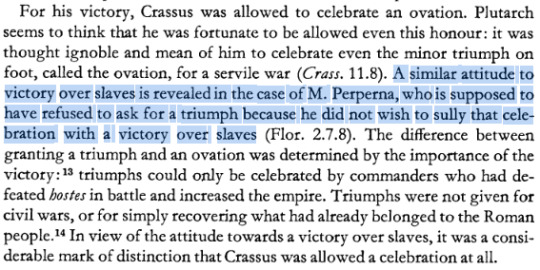
Crassus' Ovation in 71 B.C., B.A. Marshall
I think it's important to remember that for Rome as a whole, the Third Servile War was terrifying because of the scale of the threat it posed to how an imperial wheelhouse running on a slave economy functions, but also because it's really fucking embarrassing for Rome's identity.
Crassus is also not the first person who commands the leading role against Spartacus. Spartacus goes through two other commanders before Rome asks Crassus to enter the scene. Crassus specifically is a private citizen when he is asked to step into this role: up until now, Rome's own praetors and consuls have failed to rise to the occasion.

Crassus' Ovation in 71 B.C., B.A. Marshall

Marcus Crassus and the Late Roman Republic, Allen Mason Ward
this is a deeply humiliating moment for the Roman reputation and identity. Pompey taking credit for Crassus' victory is an expected power grab, but it's also kind of cringe that he did it. Crassus was doing Roman's Duty To The State (or, if you like a spicier take on it, may have pulled strings for it. after all, you can't consider a man rich unless he can fund his own army. and the army Crassus brought with him for this was is own)

and so taking credit for that is like. man. this was NOT a "glorious war" that was fought. (Lucullus cites this as a blemish on Pompey's character during his vulture speech, it's very fun!)
so while Crassus may have realized that writing back to Rome and requesting back up was a mistake because whoever showed up would have the world's easiest time taking credit and accepted that it would happen, I do think that he took alternative measures to even the playing field in a 'okay sure, have your triumph, but don't think you're going to have it all,' kind of way because he also does this
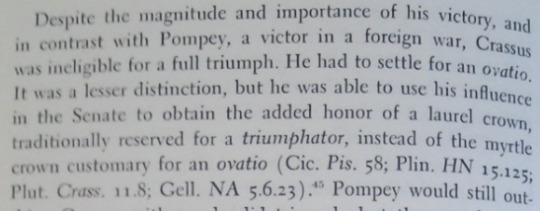

Marcus Crassus and the Late Roman Republic, Allen Mason Ward

Pliny, Natural History 15.125

Gell. NA 5.6.23

Cic. Pis. 58
which does not strike me as the behavior of someone who is letting Pompey just run away with it without any kind of pushback.
and now to throw out literally everything I just said about the Triumph Incident, B.A. Marshall (whose article I've cited several times already in this) has an incredibly compelling case to make that there wasn't really as much conflict between the two over this as ancient narratives might indicate (which. seems to be a recurring theme with them)

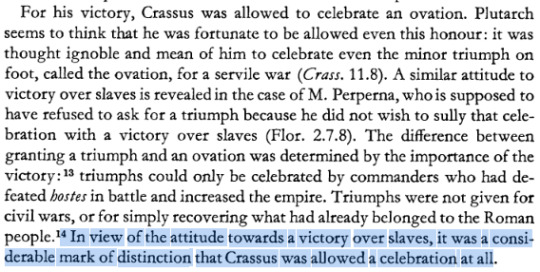

Crassus' Ovation in 71 B.C., B.A. Marshall
I will stick to my narrative speculation that some of their respective peers probably thought it was at least embarrassing behavior on Pompey's part, because Lucullus has a lot of vitriol to direct at Pompey, and he does cite this incident as something negative to Pompey's overall character) someone who steals credit and glory from other people). so. hm. I think the assumed personal and periodically biting rivalry (in addition to the usual political rivalry) between the two is extremely fun, but so is. this. thoughts! much to think about.
#.....i think i got a little off topic here. i actually have a writing doc up bc i wrote a whole draft for a reply#bc with patterns in their politics is like. ohhhhhh my god do i have thoughts about how they keep working together.#even when they're fighting they're working together it makes me unwell#people will speculate that pompey and crassus may have worked together to avoid another civil war during their lifetime#and i was like. well that's kind of generous. but its like. well. WELL!!!!!#unfortunately a lot of the political undermining and scheming and fuckery fully broke the republic beyond repair like RIP. so sorry for#you all. i cant even fully blame it on them. after all. they are considered sullan proteges. the ghost of sulla strikes again!#anyway i think politically he has a different kind of ruthlessness: iron clad conviction and the brains to know#how to accomplish it. terrifying combination!#like when people were in my tags going 'good for him!' about punching a fellow senator#like babes. he was not the good guy in that moment. what they were trying to pass was very much Not Good For The Republic#like he was absolutely eroding the fail safes on the roman republic political system On Purpose#ask tag#long post
14 notes
·
View notes
Note
In a fictional setting, how do you think Alexander would react to defeat? Let's say some guy, who wasn't a warrior, stood up to Alexander and said "You will not defeat us. We will not become slaves!" He's convinced everyone Alexander runs a slave state, and this is a fight against tyranny (not exactly true but it sells). Unlike Darius, he never retreats. In short if Alexander was defeated in battle, would this enrage him, or would he seek to recruit this person? What if the person said no?
Alexander and Resistance/Insurgency
This question is modern in some fundamental ways. That’s not a slam, but is an important point. It poses a situation that speaks to modern ideals rather than ancient conceptualizations.
Thing is, this happened quite a lot. It defines much of the conflict Alexander experienced in India as he moved down the Indus River. Also earlier, in Baktria-Sogdiana.
Alexander inevitably beat the crap out of the rebelling group, butchering anybody he perceived as a rebel. Why he won (however Pyrrhic the victory) is that he refused to give up, perceiving resistance to him as defiance that must be eliminated. It’s not a pretty picture.
So, let’s break down the question.
“Slave state” is a modern concept, and nothing like an abolitionist movement existed then.
Slavery was ubiquitous: so fundamental, ingrained, and assumed that slaves might own slaves, who might own slaves. By the Roman imperial period, slaves could be wealthy, especially skilled slaves. Generally, slavery was regarded as a result of ill fortune, disfavor of the gods, or even inherent inferiority (the beginnings of scientific racism, rooted in geographic determinism).
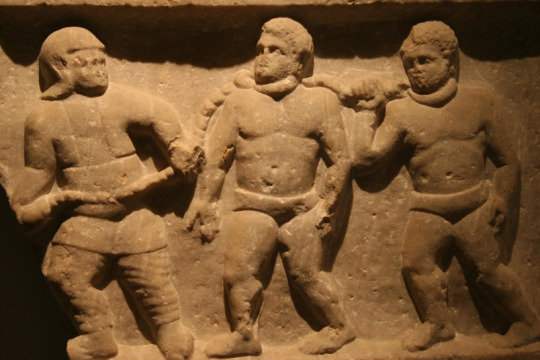
Did people want to become slaves? Of course not. Did entire populations resist conquest, choosing to die rather than become slaves? Absolutely. Was a fight against “tyranny” not used as a battle cry? It absolutely was.
But in ATG’s day, nobody would frame it as fighting a slave state. Even later slave revolts such as the Third Servile War [e.g., Spartacus’s Revolt] shouldn’t be understood as a philosophic fight against the institution of slavery so much as one slave who’d had enough. No “movement” arose from it. (Forget the 1960s Spartacus.)
The goal was to avoid becoming a slave yourself. It’s important to understand how resistance to conquest was framed. Claiming ATG ran a “slave state” would carry no weight. Everybody was a slave state, even if (by modern definitions*) that’s not technically true.
We know how ATG reacted to defeat: he viewed it as temporary—and made it so. We see this in sieges like Halikarnassos, Tyre. He just keeps pounding you. Not unlike Rome. Beat them and they come back, and beat you the next time. He learned from his defeats. As a battle commander, he was nothing if not agile. The worst defeat the army suffered was the massacre at Marakanda in Baktria (led by Spitamanes). In fact, he was mostly losing in Baktria, until he figured out why the resistance was occurring, then married his way to peace.
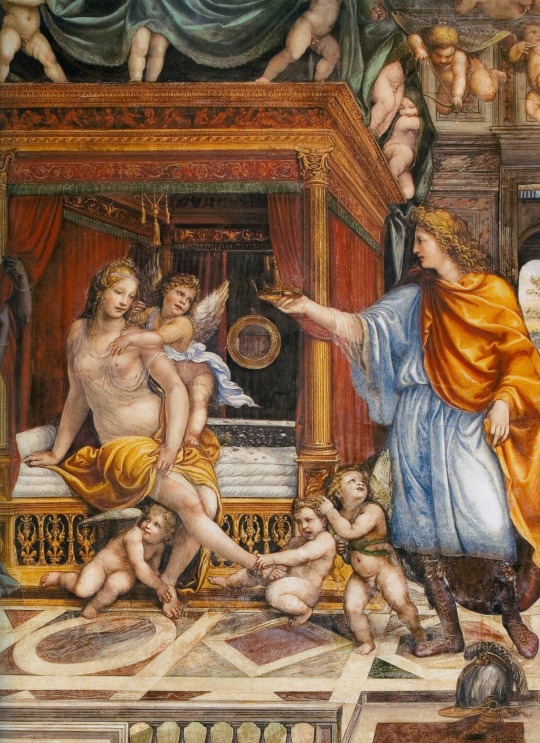
Ultimately he succeeded because he figured out how to win, then did whatever it took.
In India, things got even uglier. Lots of resistance as he made his way south down the Indus, especially from the Brahmins. He just mowed them down. But! If people surrendered, he granted clemency and didn’t kill them. That bad cop/good cop routine worked (mostly). But success was temporary. After his death (and perhaps even before), areas of India went back into revolt, with the (curious) exception of Poros, who he defeated at the Battle of the Hydaspes but subsequently befriended due to his bravery on the battlefield. BUT also because he surrendered.
This brings me to the concept of conquest and clemency. Equality was not a thing, even in a democratic state like Athens. It was still all about proving your exceptionalism. Ethnocentrism was universal and “Live and let live” not a concept most ancient cultures would have understood.
Yes, people regularly fought to maintain their freedom and independence, but loss was routinely interpreted as having the gods against you, and/or “natural” weakness. Victory meant “I’m better than you,” either due to divine favor or natural superiority. A sort of schoolyard mentality. Worth was proven by success. Alexander very much subscribed to this. He believed himself the son of Zeus-Ammon in part because he kept winning. Ergo, the gods were on his side.
Therefore, to quote Apollo 13, “Failure is not an option.”
Yet tucked inside all that—the inherent tension—was admiration for courageous resistance. This was also important to Alexander. He wanted to win a fair fight and have that acknowledged, as it meant (again) divine approval. If he felt somebody was cheating, or cowardly, he just got angry. This also defines his reaction to those who surrendered, only to resist later. To him, they’d broken a sacred contract.
And that brings me to Poros, why ATG went from War to Besties with the man. To Alexander, the conflict wasn’t personal, but about conquest, which meant, “We’re here to prove who’s better by right of combat.” When Porus fought bravely, lost, then surrendered: that was the script ATG wanted! Why? It let him be magnanimous in his victory. He returned Poros’s kingdom to him and added another kingdom as well!
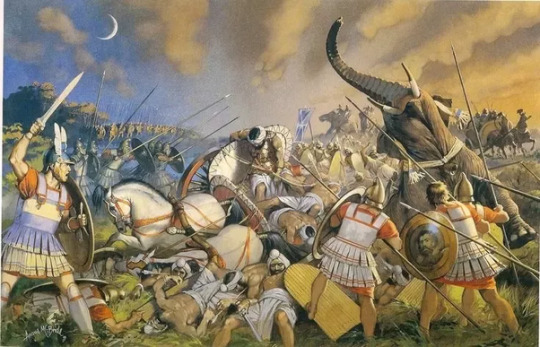
But note something here: who’s the giver? Alexander. That’s what clemency was: a grant of grace to somebody below you in the pecking order. This isn’t an alliance, no meeting of equals. Alexander GRANTS favors.
That means he cannot accept defeat. As long as he was on top, he wasn’t a terrible overlord, comparatively—assuming he cared enough to pay attention (his main failing as a ruler). But you may not resist (win). Victory = divine approval. Defeat = loss of divine approval.
Unacceptable!
At least some Indian nations figured this out pretty quickly and used it to their advantage. They discerned he was just sweeping through the region and had no plans to stay, so “surrendered” or claimed some connection to Herakles or Dionysos, flattered him, and he passed them by, maybe even gave them gifts. If the swathe he cut through the Indus Valley was often bloody, it wasn’t entirely bloody. Much depended on how the locals played him. Further, if prior Persian attempts to hold the Indus gave any example, they could “surrender,” pat ATG on the head, send him on his way…and he’d probably never be back to bother them again.
But in short, we have a lot of examples of the situation you outline here, and absolute defiance was always met by ruthless extermination. The further ATG went, the more resources he had to draw upon, so (as with fighting the Assyrian army) it was virtually impossible for smaller groups to stand up to his army. The Hydaspes was ATG’s victory in large part because of a discrepancy in troop numbers. He still fought a brilliant battle (maybe his most clever), but faced a much smaller army than at Gaugamela.
YET had he continued into India to face larger nations, he’d not have been so successful, imnsho. And even the fading glory of the divided Zhou Dynasty in China might have rolled him up and spat him out, with his much-reduced Macedonian core. He didn’t head back west for shits and giggles and a mutiny. He had good scouting, and Poros now on his side…whose fortune it benefitted to convince ATG to go back west. So, he cut his losses and marched south.
But this gives you some context for the question. Alexander both did not accept loss, and also had enough savvy to get himself out of—or avoid facing altogether—situations that he couldn’t win.
__________________________________
* In modern parlance, a “slave state” is one in which slavery is required for economic survival. Otherwise, it’s a state (or nation) that practices slavery. In the ancient world, due to the relatively small number of slaves per household in most places, plus a category of “serfs” (such as mushkênu in Mesopotamia), defining slave states is tough. There are some. Ancient Sparta was a slave state: without the helot system, it collapsed. Rome was a slave state. But most of ancient Greece was not, and certainly not ancient Macedonia. We might consider slavery key to certain professions: mining, prostitution, but it’s hard to argue the entire society would collapse without those slaves.
That said, east to west, south to north, slavery was everywhere. Nobody questioned it, they just wanted to own the slave, not BE the slave.
#asks#Alexander the Great#Alexander and defeat#clemency#conquest#slavery in the ancient world#Classics#tagamemnon#Resistance to Alexander the Great#Alexander the Great in India#Porus#Poros
14 notes
·
View notes
Text
Rewatching season 1 of xena for the first time in probably 15 years and who tf was gonna tell me that Sam Raimi snuck clips from Kubrick's (fuckin terrible) Spartacus movie into episode 13?
Like, I know Raimi loves the history (who doesn't love the third servile war of Rome? They came closest of anyone to bringing the empire to its fucking knees) he made a whole Spartacus tv show on Starz.
But im gonna need a little warning before somebody starts playing a bad movie in the middle of a good show.
#im the biggest Kubrick anti and im not sorry#xena warrior princess#spartacus#bard school#athens city academy of the performing bards#3rd servile war of rome#i took a kubrick class in college and have seen every single one of his films#my hatred is informed and well-earned
3 notes
·
View notes